[Business Impact Analysis] [Critical Business Function] [T1] Part 1
BIA Questionnaires
CBF 1: Residential Care and Shelter Operations
This chapter examines the impact areas associated with Critical Business Function (CBF) 2: Counselling and Psychological Support at HopeHouse, a social service agency dedicated to providing holistic rehabilitation and reintegration services to at-risk youth and vulnerable individuals.
Counselling and psychological support are foundational to the organisation’s mission of emotional healing, trauma recovery, and the promotion of long-term mental wellness.
The sub-functions under this CBF include initial assessments, individual and group counselling, crisis interventions, progress monitoring, coordination with external specialists, and post-care support.
Any disruption to these services can lead to significant consequences across various impact areas—ranging from operational inefficiencies to reputational damage, financial loss, and increased client risk.
Using the framework from BCMpedia, this chapter outlines the estimated financial and operational impacts for each sub-function, their implications on Minimum Business Continuity Objectives (MBCO), and the broader effects on client care and organisational resilience.
Based on the provided structure and references, here is a detailed table for CBF-2: Counselling and Psychological Support at HopeHouse, incorporating the Critical Business Functions (CBF), CBF Code, Description of CBF, and Business Unit Minimum Business Continuity Objective (MBCO):
Part 1: Identification of Business Functions
|
Critical Business Functions (CBF) |
CBF Code |
Description of CBF |
Business Unit Minimum Business Continuity Objective (MBCO) |
|
Initial Psychological Assessment and Case Planning |
CBF2.1 |
The process involves receiving new residents, conducting assessments, documenting their information, and orienting them to the shelter. |
Resume within 4 hours to ensure no disruption in shelter admission and the safety of vulnerable individuals. |
|
Individual Counselling Sessions |
CBF2.2 |
Management of facilities, housekeeping, and essential shelter infrastructure to ensure a safe and habitable environment. |
Maintain with minimal disruption (within 2 hours) to preserve hygiene, comfort, and operational integrity of the shelter. |
|
Group Therapy and Peer Support |
CBF2.3 |
Provision of case management, counselling, mental health support, and personal development services for residents. |
Resume within 8 hours to continue essential support and prevent deterioration of resident well-being. |
|
Crisis Intervention and Emotional Stabilisation |
CBF2.4 |
Ensuring regular and nutritious meals are planned, prepared, and served to residents. |
Resume within 4 hours to avoid food insecurity and maintain residents’ health. |
|
Progress Monitoring and Reassessment |
CBF2.5 |
Access to primary healthcare, medication, and emergency medical response for residents. |
Immediate availability (within 1 hour) is critical for health and safety emergencies. |
|
External Referrals and Specialist Coordination |
CBF2.6 |
Implementation of emergency protocols, including fire, intruder alerts, and health crises, to protect residents and staff. |
Maintain continuous uptime (0 downtime) to ensure life safety and regulatory compliance. |
|
Post-Care Emotional Support and Reintegration Planning |
CBF2.7 |
Scheduling, deploying, and managing staff for 24/7 shelter coverage and service continuity. |
Respond within 2 hours to ensure uninterrupted staffing for safety and operational purposes. |
Summing Up ... for Part 1
Counselling and psychological support services are integral to the daily functioning and strategic mission of HopeHouse.
The analysis highlights that disruptions to this critical business function can lead to compounding effects—including delayed recovery for clients, reduced service quality, weakened external partnerships, and potential reputational harm. The financial losses, while varied in scale, underscore the tangible cost of operational downtime or inefficiencies.
Moreover, the close relationship between emotional well-being and long-term reintegration success makes it imperative for HopeHouse to ensure continuity and resilience within this function.
Understanding the impact areas and quantifying potential risks provides a foundation for more robust continuity planning, enabling the organisation to safeguard essential services even during crises.
[Business Impact Analysis] [Critical Business Function] [T1] Part 2
BIA Questionnaires
CBF 1: Residential Care and Shelter Operations
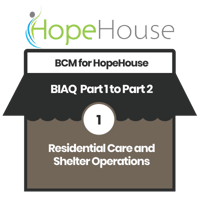 HopeHouse is a charitable organisation in Singapore dedicated to providing a safe, supportive, and structured environment for at-risk youths.
HopeHouse is a charitable organisation in Singapore dedicated to providing a safe, supportive, and structured environment for at-risk youths.
As part of its core mission, Residential Care and Shelter Operations play a pivotal role in ensuring that beneficiaries have consistent access to accommodation, care, and essential services.
This second part (Part 2) of the chapter focuses on CBF 1: Residential Care and Shelter Operations, which encompasses ten vital sub-functions that collectively sustain the day-to-day living and well-being of residents.
These sub-CBFs encompass the initial intake and admission process, as well as emergency health services and coordination with external partners.
Understanding the operational and financial impact of disruptions to these sub-functions is essential for effective business continuity planning (BCP).
The table provided in this chapter outlines each sub-function’s potential impact area, estimated financial losses, impact on Minimum Business Continuity Objectives (MBCO), and relevant remarks. This assessment is based on BCM best practices and the reference framework provided by BCM Institute.
Here is a detailed table for CBF 1: Residential Care and Shelter Operations for HopeHouse, incorporating all 10 sub-CBFs along with a structured impact assessment based on BCM Institute's guidelines.
|
|
|
|
Financial Impact |
|
|
Sub-CBF |
Sub-CBF Code |
Impact Area |
Monetary Loss (Estimated) |
Calculation of Monetary Loss (State Formula for Calculations) |
|
Initial Psychological Assessment and Case Planning |
2.1 |
Client Care & Wellbeing |
SGD 1,500/week |
(No. of clients impacted/week) × (SGD 300 lost funding per untreated client) |
|
Individual Counselling Sessions |
2.2 |
Client Stability & Mental Health |
SGD 3,000/week |
(Avg. 10 clients/week) × (SGD 300 estimated value per missed session) |
|
Group Therapy and Peer Support |
2.3 |
Emotional Support & Community |
SGD 1,200/week |
(No. of sessions missed × avg. 8 participants) × (SGD 150 value per participant/session) |
|
Crisis Intervention and Emotional Stabilisation |
2.4 |
Emergency Response Capability |
SGD 2,500/incident |
(Estimated cost per crisis × No. of unmanaged incidents) |
|
Progress Monitoring and Reassessment |
2.5 |
Outcome Tracking & Quality |
SGD 1,000/month |
(No. of missed reassessments × SGD 250 impact per case) |
|
External Referrals and Specialist Coordination |
2.6 |
Medical/Psychological Continuity |
SGD 2,000/referral delay |
(No. of delayed referrals × SGD 500 estimated per client impact due to delay) |
|
Post-Care Emotional Support and Reintegration Planning |
2.7 |
Reintegration & Aftercare |
SGD 1,800/month |
(No. of clients × SGD 300 risk of recidivism cost if unsupported) |
|
|
|
Impact on MBCO |
|
|
|
Sub-CBF |
Sub-CBF Code |
Affect MBCO |
Impact |
Remarks – Description |
|
Initial Psychological Assessment and Case Planning |
2.1 |
Yes |
Delay in assessments compromises timely intervention, risking residents’ stability |
Foundational for individualised care planning; critical for the treatment journey |
|
Individual Counselling Sessions |
2.2 |
Yes |
Interruptions may lead to emotional regressions or behavioural issues |
Core function in trauma recovery and emotional resilience development |
|
Group Therapy and Peer Support |
2.3 |
Yes |
Loss affects peer bonding and group cohesion; critical for social healing |
Builds communal support essential for reintegration |
|
Crisis Intervention and Emotional Stabilisation |
2.4 |
Yes |
High – delays in response can lead to self-harm or escalation of psychological crises |
Time-sensitive, requires immediate availability of trained professionals |
|
Progress Monitoring and Reassessment |
2.5 |
Yes |
Inaccurate progress data hinders treatment planning and donor reporting |
Essential for evaluating effectiveness and adjusting care plans |
|
External Referrals and Specialist Coordination |
2.6 |
Yes |
Delays may worsen clinical issues, reducing program effectiveness |
Ensures access to specialist support beyond HopeHouse |
|
Post-Care Emotional Support and Reintegration Planning |
2.7 |
Yes |
Gaps in post-care may lead to relapse or return to harmful environments |
Crucial for sustained wellbeing and long-term stability post-program |
Summing Up ... for Part 2
The Residential Care and Shelter Operations function is the backbone of HopeHouse’s service delivery to vulnerable individuals.
Any disruption to the sub-functions under CBF 1 can significantly affect the organisation’s ability to provide safe, compliant, and continuous care.
As demonstrated in the impact assessment table, most sub-functions have a direct effect on the organisation's regulatory obligations, stakeholder trust, financial stability, and resident welfare.
To uphold service excellence and regulatory compliance, HopeHouse must implement tailored recovery strategies, conduct regular risk assessments, and maintain robust contingency measures for each sub-function.
Strengthening these operational pillars will not only safeguard the physical and emotional well-being of residents but also reinforce HopeHouse’s mission in the community.
More Information About Business Continuity Management Courses
To learn more about the course and schedule, click the buttons below for the BCM-300 Business Continuity Management Implementer [BCM-3] and the BCM-5000 Business Continuity Management Expert Implementer [BCM-5].





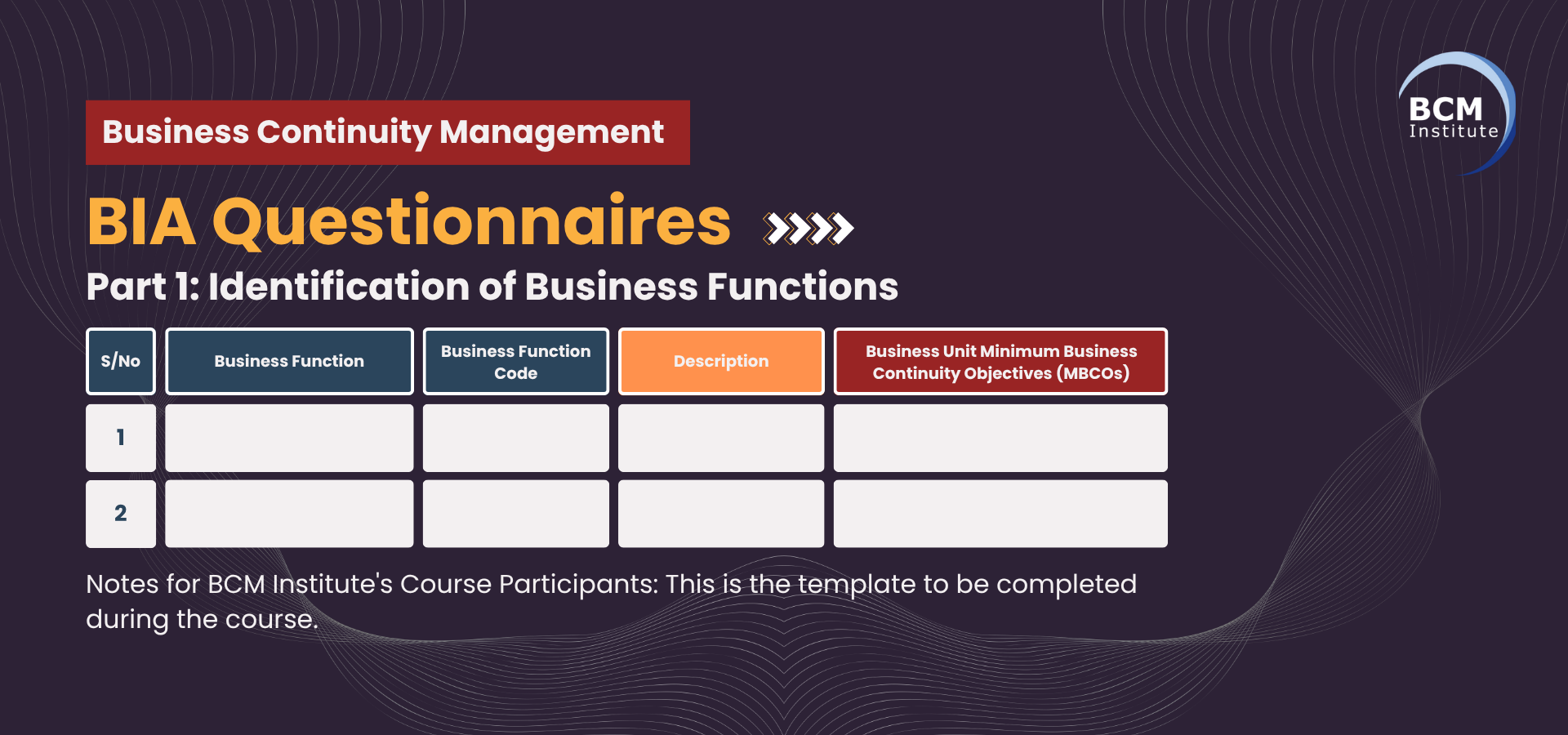

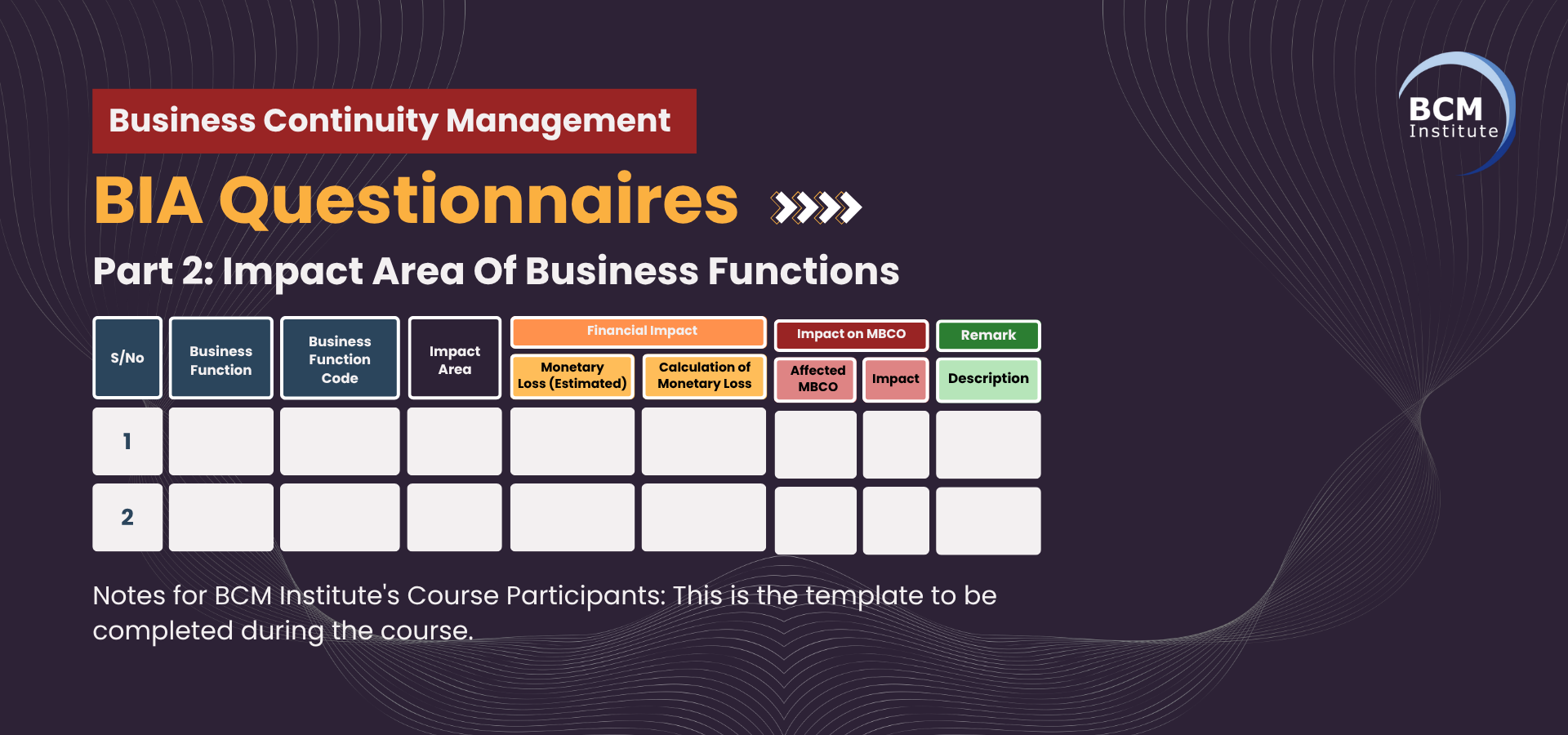
![[BCM] [HH] [BIA] MBCO Corporate MBCO](https://no-cache.hubspot.com/cta/default/3893111/c69ab48c-f2a4-4448-aa36-dab7ef97523e.png)
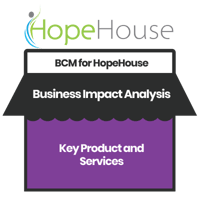
![[BCM] [HH] [E3] [RAR] [T1] List of Threats](https://no-cache.hubspot.com/cta/default/3893111/1ef4bbea-8438-4853-9dd4-e9ef4c48e1b1.png)
![[BCM] [HH] [E3] [RAR] [T2] Treatment and Control](https://no-cache.hubspot.com/cta/default/3893111/208f472a-0f0e-443b-aadf-e0c6483ff8e2.png)
![[BCM] [HH] [E3] [RAR] [T3] Risk Impact and Likelihood Assessment](https://no-cache.hubspot.com/cta/default/3893111/89337c47-a337-4077-9ee3-a4c0d222bc00.png)
![[BCM] [HH] [E3] [BCS] [T1] Mitigation Strategies and Justification](https://no-cache.hubspot.com/cta/default/3893111/d17b595b-9bfc-4810-a8d5-9591e467fd62.png)
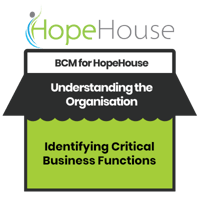
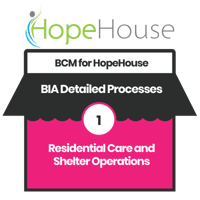
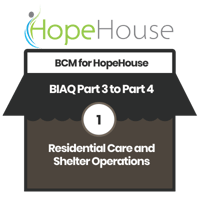
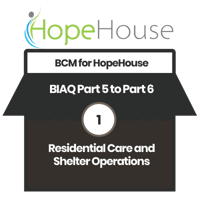
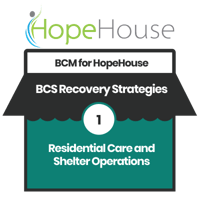
![[BCM] [HH] [E3] [BCS] [T3] [CBF] [1] Minimum Resources Required during a Disaster](https://no-cache.hubspot.com/cta/default/3893111/97a4ab91-3eda-44df-b341-6e5d4ef311fd.png)
![[BCM] [HH] [E3] [PD] [CBF] [1] Residential Care and Shelter Operations](https://no-cache.hubspot.com/cta/default/3893111/43ea4330-255a-4ea5-82d9-bba2665e62cd.png)


![Register [BL-B-3]*](https://blog.bcm-institute.org/hs-fs/hubfs/hub_generated/resized/19a8306f-6b76-45ff-8585-95111f393aeb.png?width=200&height=56&name=19a8306f-6b76-45ff-8585-95111f393aeb.png)



![FAQ [BL-B-3]](https://blog.bcm-institute.org/hs-fs/hubfs/hub_generated/resized/9b7f5669-8ad6-450b-a98f-5f5d49ebfc8e.png?width=150&height=150&name=9b7f5669-8ad6-450b-a98f-5f5d49ebfc8e.png)
![Email to Sales Team [BCM Institute]](https://blog.bcm-institute.org/hs-fs/hubfs/hub_generated/resized/83ae9ad3-affc-416e-8f51-64218d6d98f2.png?width=100&height=100&name=83ae9ad3-affc-416e-8f51-64218d6d98f2.png)





